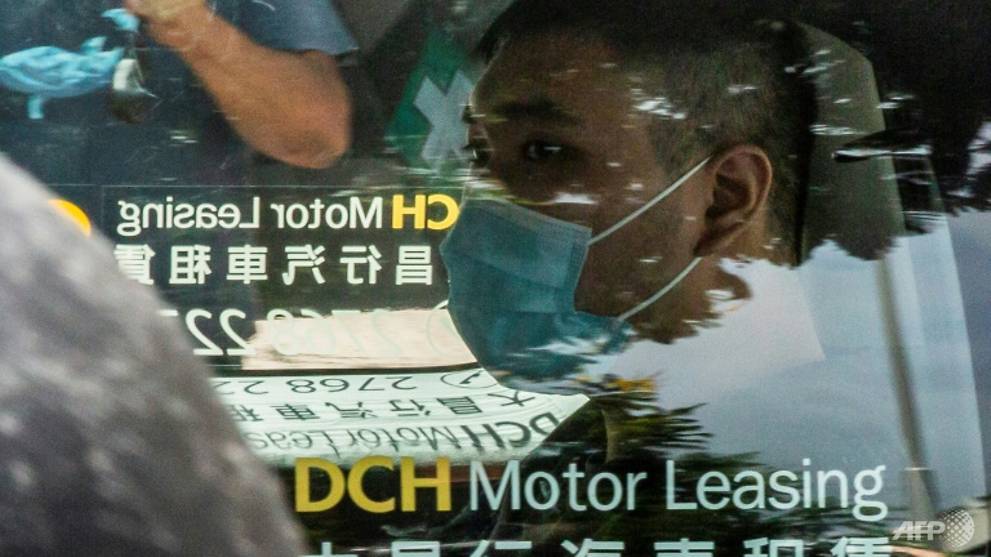
HONG KONG: Hong Kong's most vocal pro-democracy newspaper Apple Daily said it will print its last edition on Thursday (Jun 23) after a stormy year in which it was raided by police and its tycoon owner and other staff were arrested under a new national security law.
The closure of the popular tabloid, which mixes pro-democracy views with celebrity gossip and investigations of those in power, marks the end of an era for media freedom in the Chinese-ruled city, critics say.
"Thank you to all readers, subscribers, ad clients and Hong Kongers for 26 years of immense love and support. Here we say goodbye, take care of yourselves," Apple Daily said in an online article.
READ: No jury as Hong Kong's first 'national security' trial gets under way
Apple Daily's support for democratic rights and freedoms has made it a thorn in Beijing's side since owner Jimmy Lai, a self-made tycoon who was smuggled from mainland China into Hong Kong on a fishing boat at the age of 12, started it in 1995.
It shook up the region's Chinese-language media landscape and became a champion of democracy on the margins of Communist China. Its demise leaves only a handful of small online outlets on that side of politics, including Stand News and Citizen News.
Staff unions at Citizen News and six other media groups said they would wear black on Thursday in protest at what they described as “the government’s blow against freedom of the press”. Management at Citizen News and Stand News could not be reached for comment outside of office hours.
DISSIDENTS
While viewed as tawdry at times by some of its critics, supporters championed Apple Daily as a beacon of media freedom in the Chinese-speaking world. It is read by dissidents and a more liberal Chinese diaspora - repeatedly challenging Beijing's authoritarianism.
Lai, whose assets have been frozen, has been in jail since December on charges of taking part in unauthorised assemblies, stemming from pro-democracy protests.
Some rights groups, media organisations and Western governments have criticised the action against the newspaper.
"It will put a lot of pressure on all those who write reports or editorials," said Ronson Chan, head of the Hong Kong Journalists’ Association. "We just don’t know what the red line is.”
Hong Kong leader Carrie Lam said on Tuesday criticism of the raid on the newspaper amounted to attempts to "beautify" acts that endangered national security. Chinese officials have denounced the criticism as interference.
Hong Kong and mainland officials have repeatedly said that media freedoms are respected but are not absolute.
Apple Daily, which is published by Next Digital and employs hundreds of journalists, said in its online article that the decision to close was "based on employee safety and manpower considerations".
Since being raided by police, the newspaper has suffered mass resignations and entire departments had to close.
Apple Daily and Next Digital management could not be reached to comment further.
In an interview with Reuters, an adviser to Lai said on Monday the paper would close “in a matter of days” as authorities had frozen company assets, leaving it unable to pay staff or operate.
'EMPLOYEE SAFETY'
About 200 police raided the paper's newsroom in August last year, when Lai was arrested on suspicion of colluding with foreign forces, and again last week, by 500 police, when five other executives were detained.
On both occasions, the paper said it increased its print run to 500,000 the following day from the usual 80,000, and residents of the city of 7.5 million queued up at news stands to buy it to show their anger at the crackdown.
Apple Daily, whose online version will stop updating, said it expected to print one million copies on Thursday.
READ: Crackdown brings resignations at Hong Kong pro-democracy paper Apple Daily
READ: Hong Kong leader says press must not 'subvert' government
“The arrests of Apple Daily staff, seizing of journalistic materials and freezing of its assets will send a shiver down the spine of all media outlets operating in Hong Kong," said Amnesty International's Asia-Pacific regional director Yamini Mishra.
The police action was seen as the most direct attack on Hong Kong's freewheeling media since Beijing regained control of the city in 1997.
Authorities in Hong Kong have said the moves against Apple Daily were not targeting the media industry or press freedom.
The security law imposed on the city last year was Beijing's first major move to put Hong Kong on a more authoritarian path.
Hong Kong leader Lam and other pro-Beijing officials have said it has restored stability after months of often-violent pro-democracy protests.
BANNER
The Taiwan arm of Apple Daily said it would continue to publish online given its independent finances.
Apple Daily has come under increasing pressure since Lai was arrested last year under the security legislation.
Police last week froze assets of companies linked to the newspaper and arrested five executives, effectively choking its operations. On Wednesday, police arrested a columnist on suspicion of conspiring to collude with foreign forces.
Authorities have said dozens of Apple Daily articles may have violated the security law, the first instance of authorities taking aim at media reports under the legislation.
Next Digital has been kept afloat by loans from Lai. In May, Reuters reported exclusively that Hong Kong’s security chief had sent letters to branches of HSBC and Citibank threatening up to seven years’ jail for any dealings with the billionaire' s accounts in the city.
A handful of Beijing supporters celebrated the paper's demise with champagne and a "Fake News" banner in front of its headquarters.
https://news.google.com/__i/rss/rd/articles/CBMiY2h0dHBzOi8vd3d3LmNoYW5uZWxuZXdzYXNpYS5jb20vbmV3cy9hc2lhL2hvbmcta29uZy1hcHBsZS1kYWlseS1uZXdzcGFwZXItZW5kLW5leHQtZGlnaXRhbC0xNTA3MjkxMtIBAA?oc=5
2021-06-23 14:37:30Z
52781678443879

